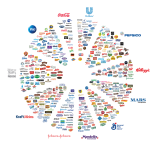- Mar 1, 2024
- 1,534
How we use the internet is largely shaped by a handful of US-based tech giants — Google, Apple, Microsoft, Amazon, and Meta in particular. While they may make life more convenient, that convenience comes at a cost: your privacy. Their apps collect vast amounts of personal data, using it to refine algorithms, target ads, and — when required — even share that data with governments and law enforcement.There are tools, however, that let you take back that control. If you want to use the internet without giving up your most sensitive, valuable data, many European services offer a privacy-forward alternative.Privacy-focused European alternatives
- Proton Mail (Gmail alternative)
- Proton Drive (Google Drive alternative)
- Proton Docs (Google Docs alternative)
- Proton Pass (Google Password Manager alternative)
- Proton Calendar (Google Calendar alternative)
- Proton VPN(new window) (VPN alternative to US-based services)
- Qwant(new window) (France): A privacy-first search engine that doesn’t track users; currently based on Bing, Qwant and Ecosia(new window) have teamed up to build a European search index
- Ecosia(new window) (Germany): Privacy-focused search engine that funds tree planting with ad revenue
- Mojeek(new window) (UK): Independent search index with strict privacy policies
- Vivaldi(new window) (Norway): Customizable browser with strong privacy features
- LibreWolf(new window) (EU): Firefox-based browser focused on security and privacy
- Waterfox(new window) (UK): Strips out Firefox’s telemetry and tracking
- Threema(new window) (Switzerland): End-to-end encrypted, metadata-minimizing chat
- Olvid(new window) (France): No phone number required, highly secure
- Session(new window) (EU): Decentralized, anonymous chat
- Delta(new window) Chat(new window) (EU): Uses standard email for encrypted messaging
- Element (Matrix)(new window) (EU): Open-source, federated messaging
- Wire(new window) (Switzerland): Secure, end-to-end encrypted messaging for personal and business use
- OsmAnd(new window) (EU): Open-source maps with offline navigation
- Organic Maps(new window) (EU): No tracking, minimal battery usage
- Magic Earth(new window) (Netherlands): AI-powered maps without data harvesting
- HERE WeGo(new window) (Germany): Major competitor to Google Maps
- OVHcloud(new window) (France): Large EU host with a range of cloud and server options
- Infomaniak(new window) (Switzerland): Swiss-based hosting with strong privacy protections
- Hetzner(new window) (Germany): Affordable, high-performance hosting based in the EU
- Deezer(new window) (France): Alternative to Apple Music
- Qobuz(new window) (France): High-resolution music streaming
- SoundCloud(new window) (Germany): Independent artist platform
- Spotify(new window) (Sweden): Popular music streaming platform with a massive global catalog
- PeerTube(new window) (EU): Decentralized YouTube alternative
- DailyMotion(new window) (France): YouTube competitor with privacy focus
- Standard Notes(new window) (Switzerland): Encrypted note-taking alternative to Google Docs
- CryptPad(new window) (France): Secure, collaborative Google Docs alternative
- Mastodon(new window) (Germany): Decentralized alternative to Twitter/X
- Lemmy(new window) (EU): Federated Reddit-style platform
- Friendica(new window) (EU): Alternative to Facebook
- DeepL(new window) (Germany): High-quality translation alternative to Google Translate
- Reverso(new window) (France): AI-powered translation tool
- ModernMT(new window) (Italy): Business-grade translation service
- Jitsi(new window) (EU): Open-source Google Meet alternative
- Whereby(new window) (Norway): Privacy-focused video conferencing
- /e/ OS(new window) (France): DeGoogled Android alternative
- SailfishOS(new window) (Finland): Secure mobile OS
- Ubuntu(new window) (UK): Popular Linux-based desktop OS
- Linux Mint(new window) (EU): Windows/Mac alternative
- Codeberg(new window) (EU): Alternative to GitHub
- JetBrains(new window) (Czech Republic): IDE competitor to Visual Studio
- SonarQube(new window) (Switzerland): Code analysis tools
- Blender(new window) (Netherlands): Free, open-source 3D animation tool used to create Flow, the Latvian film that beat Disney at the Oscars
- Affinity(new window) (UK): Alternative to Adobe tools
- Sketch(new window) (Netherlands): Alternative to Figma
As governments expand their reach, often with the help of Big Tech, control over our lives online is at risk of slipping away. But you are not powerless. You can still choose services that put privacy first — where your messages, files, and personal details aren’t collected, stored, or shared.

Wary of US surveillance? Try these European alternatives to Big Tech | Proton
Take back control of your digital life with privacy-focused European alternatives to US Big Tech apps and services.



